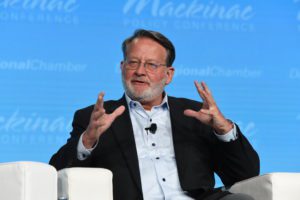Michigan’s Congressional Leaders: Civility is a Priority for Progress
June 1, 2022Key Takeaways:
- While opposing political parties don’t always see eye-to-eye, bipartisan bills are being passed, and discussions are being had among members of congress.
- Gun control is an area of contention among Democrats and Republicans; the recent mass shootings in the U.S. have led to more behind-the-scenes discussions and problem-solving initiatives in congress that aren’t typically shared by the media.
- Bipartisan bills have passed related to providing military aid to Ukraine, as well as the Baby Formula Act of 2022
 How do we solve America’s problems among members of opposing political parties? Harold Ford Jr., vice chair of corporate and institutional banking at PNC, interviews Senator Gary Peters (D-MI) and Senator Debbie Stabenow (D-MI) on recent success stories and challenges for Democrats and Republicans in Congress at the 2022 Mackinac Policy Conference on Wednesday, June 1.
How do we solve America’s problems among members of opposing political parties? Harold Ford Jr., vice chair of corporate and institutional banking at PNC, interviews Senator Gary Peters (D-MI) and Senator Debbie Stabenow (D-MI) on recent success stories and challenges for Democrats and Republicans in Congress at the 2022 Mackinac Policy Conference on Wednesday, June 1.
Stabenow began the conversation by highlighting a recent bipartisan success story: passing the Access to Baby Formula Act of 2022; the bill will ensure families in need can continue to buy formula in the event of a future supply chain issue or public health crisis.
“Both Debbie and I take pride in working across the aisle and trying to solve the tough problems we have,” Peters said. Peters pointed to additional areas of agreement among the Democratic and Republican parties, including community mental health funding and providing over $50 billion for the U.S. Postal Service to ensure mail is delivered.
 Stabenow and Peters agreed that gun laws are a major area of disagreement among the political parties. Both are hopeful that an agreement will soon be reached.
Stabenow and Peters agreed that gun laws are a major area of disagreement among the political parties. Both are hopeful that an agreement will soon be reached.
“I think we’re seeing some signs after these two horrific tragedies [in Buffalo, New York and Uvalde, Texas, ten days later],” Peters said. “I think what we have to do is step back and understand that there is no one thing we can do to correct all of this… it’s going to be a process.” Peters went on to emphasize the need for background checks after two back-to-back mass shootings.
Stabenow and Peters also touched on the need for bipartisan support in bringing more jobs to America, especially following the massive breakdown of the supply chain’s efficiency during the pandemic.
“We need to look at how we can make things in America… there is no reason this can’t be the decade where we just rock and roll, both as Michigan as well as our country,” Stabenow said.
The latter half of the discussion on the need for greater bipartisan consensus was moderated by Ford Jr. and featured U.S. Representative Debbie Dingell (D-MI 12), U.S. Representative Bill Huizenga (R-MI 2), and U.S. Representative Elissa Slotkin (D-MI 8).
“The Great Lakes is where we have the most commonality — it’s very critical that we protect our water,” Dingell said.
For Slotkin, the Russian-Ukraine War was another area where she felt the parties were able to agree and develop solutions.
 “For me, it is the single most bipartisan thing that I’ve worked on in my three-and-a-half years in Congress,” Slotkin said. “We were tag-teaming – literally, we were looking at each other from across the table — it felt good to be on the same team.”
“For me, it is the single most bipartisan thing that I’ve worked on in my three-and-a-half years in Congress,” Slotkin said. “We were tag-teaming – literally, we were looking at each other from across the table — it felt good to be on the same team.”
The major area of disagreement mimics, once again, was related to gun legislation.
Slotkin points to recent efforts being made in congress through the problem-solvers caucus involving a group of senators aiming to develop gun control solutions, such as universal background checks.
“The idea that we can’t do anything, that we are going to try the same process, is infuriating,” Slotkin said.
While gun control is one of the more contentious arguments, Huizenga emphasized that what is portrayed in the media doesn’t mirror what truly goes on among congressional leaders.
“We get along better than what you will see in the media — there a lot of people behind the scenes who are doing the work and who are willing to have conversations,” he said.
